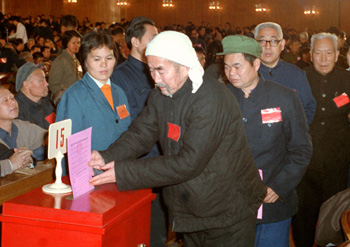Q: In Western countries, laws are usually drawn by
congresses with unitary, composite or checks-and-balances
legislative systems. Compared with these systems, what features
does the Chinese legislative system have? What progress has China
made in developing democratic politics, administering state affairs
according to law and establishing a country ruled by
law?
A: Compared with unitary, composite and balanced legislative
systems commonly existing in other countries, the Chinese
legislative system is unique. First, the legislative power in China
is not handled by one particular department or person, therefore
the Chinese legislative system is not a unitary one. Second, there
are several kinds of legislative powers in China, such as state
legislative power, administrative regulations legislative power,
and local regulations legislative power. Different departments
perform these powers, so the Chinese legislative system does not
belong to a composite one. Third, the Chinese legislative system is
not checks-and-balances one, for it is not based on the principle
of checks-and-balances among legislative, administrative and
judicial departments. The National People's Congress (NPC) elects
both the president of the People's Republic of China and the
premier of the State Council. The president puts forth laws in
pursuance of the decisions of the NPC and its Standing Committee,
and the premier has no power to approve or veto legislation of the
NPC. Administrative regulations shall not contravene laws adopted
by the NPC, local regulations shall not contravene laws and
administrative regulations, and the NPC has the power to annul
administrative regulations and local regulations that contravene
the laws it has made. All of these guidelines indicate the
affiliation, unification and supervision in the Chinese legislative
system, not a checks-and-balances relationship.
The present Chinese legislative framework was established by the
Constitution in 1982. In terms of legislative power, it consists of
both the leadership of the Central Government and division of power
to a certain extent. The NPC and its Standing Committee make
national laws, the State Council and its departments draw up
administrative regulations and rules, and local people's congresses
and governments make local regulations and rules. But their powers
and the force of the legal documents are different, forming a
legislative system that includes state legislative power,
administrative regulations legislative power, local regulations
legislative power, autonomous regulations and special rules
legislative power, rules legislative power, delegated legislative
power and legislative power of special administrative regions.
With such a legislative system, work in Chinese legislation has
obtained great achievements. Statistics show that from 1979 to
March 2003, besides the Constitution in 1982 and three
constitutional amendments, the NPC and its Standing Committee
enacted more than 420 laws and decisions on related legal issues,
the State Council drew up more than 900 administrative regulations,
local people's congresses with legislative power formulated or
approved more than 8,000 local regulations, and departments under
the State Council or local governments made more than 50,000 rules
according to their functions. All of these legal documents lead to
a situation where there are laws to follow in the significant and
ordinary aspects of the country, laying a solid foundation for the
socialist legal system with Chinese characteristics.
 |
China marked the 50th anniversary of the
establishment of the National People's Congress system in 2004.
Pictured were deputies to the National People's Congress voting for
the fourth Constitution of China on November 26, 1982.